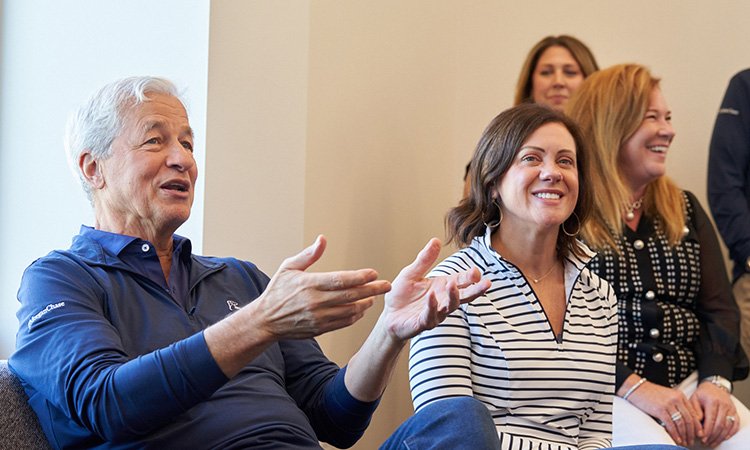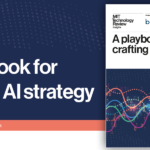Jamie Dimon’s Heartland bus tour rolled into Minnesota Tuesday as Gov. Tim Walz kicked off his candidacy for vice president on the Democratic ticket.
While a national and Minnesota media frenzy was unfolding over the Walz selection, Dimon, chairman and CEO of JPMorgan Chase & Co., was in an Edina bank branch to hear from employees and talk to the media.
Dressed in blue jeans, a deep blue pullover shirt, and black tennis shoes, Dimon, the veteran CEO of the nation’s largest bank, asked employees what they did at the Edina branch that’s across the street from the Galleria. Some had previously worked for Wells Fargo and U.S. Bank, and he asked them to contrast their experiences with Chase.
Then Dimon did media interviews in the bank before boarding the bus to Omaha to hear from more employees and check in with investment icon Warren Buffett.
In an interview with four Twin Cities reporters, Dimon discussed the local Chase bank expansion, stock market volatility, the Federal Reserve, and his strong views on failed federal policies ranging from education to housing and taxes.
Expanding the Chase footprint
In a crowded banking landscape, JPMorgan Chase continues to open more Chase bank branches in the Twin Cities market.
“We’re generally accomplishing what we hoped to accomplish” in the Twin Cities branches, with some doing more business and some less than projected, Dimon said. He spotlighted small business, private, middle market, and investment banking services as well as outreach efforts to Black and Hispanic communities.
“We study, we analyze, and then we make our own decisions,” he said, without worrying about how many competitors are in a specific metro area. “I don’t really care what other people do.”
Chase operates bank branches in all of the lower 48 U.S. states and expanded its network by more than 650 branches over the past five years. In Minnesota, the first branch was opened in 2018 near the University of Minnesota.
Chase currently operates 34 branches in the greater Twin Cities metro area, and it expects to reach 60 total by 2027, according to company spokesman Brian Hanover.
“We bank a lot of your biggest corporations here,” Dimon said. “We’re expanding all over America.”
He acknowledged there’s a difference between what Chase is doing in comparison with some longstanding banks in Minnesota. “They are in communities I don’t have,” he said. “They have local real estate knowledge we don’t have. They have local relationships we don’t have. But there are a lot of things we do that they can’t. We move $10 trillion around the world every day. We can raise capital for eight different currencies.”
Ready for economic contingencies
Dimon has been CEO of JPMorgan Chase since Jan. 1, 2006, so he’s navigated through the Great Recession, the Covid-19 pandemic, federal government shutdowns, and wars around the globe.
Consequently, he took Monday’s stock market declines in stride. A weak U.S. jobs report on Friday triggered a global sale of stocks on Monday.
“My reaction is virtually nothing,” Dimon said in Edina on Tuesday during a stock market rally. He compared that volatility to “the weather,” which constantly changes.
However, the jobs report and reaction of stock markets has placed heightened interest in the Federal Reserve’s September meeting.
“I do expect they’ll cut [interest] rates because obviously recent data has been pretty bad,” Dimon said. “I don’t think that’s going to make that much difference at all.”
As the Federal Reserve trained its attention on bringing down inflation, many consumers are still struggling to pay for everyday expenses that include groceries. Dimon said it’s difficult to predict whether the Fed will steer the U.S. economy into a hard or soft landing, but his business is prepared for multiple scenarios.
Disappearing American dream
In a commentary published Aug. 2 in The Washington Post, Dimon wrote that “the American dream is disappearing for many.”
He wrote: “Sadly, we lack coherent energy, education, infrastructure, housing, tax and immigration policies. While we agree sometimes on the problems and the goals, our prescriptions are too often simplistic and poorly designed.”
When asked about the commentary in Edina Tuesday, Dimon emphasized the nation’s foundational freedoms of speech, religion, and enterprise. “This is the most extraordinary nation on the planet,” he said. “It is an exceptional nation. I do not like it when people denigrate it.”
Referring to his grandparents as “Greek immigrants who did not go to high school,” Dimon stressed that all Americans have the “same individual rights.”
But he lamented the chronic nature of many domestic problems. “You can blame Democrats or Republicans,” he said. “I would say policies failed. They didn’t work.”
He’s calling for substantial policy changes.
“People in the bottom 20% of income, their incomes didn’t go up for 20 years,” he said. “Their health got worse, their schools aren’t as good.”
He wants high schools to teach skills, such as coding, welding, and plumbing, so high school graduates could move into jobs that pay $45,000 to $65,000 a year. He would expand the earned-income tax credit. “That would put more income into the hands of people who need it the most, and they can spend it on their families and in their communities without government micro-managing,” he said.
“It also has the benefit of jobs bringing dignity,” he said. “Jobs are known to reduce homelessness and crime. Jobs create household formation.”
He also advocated for a strategy that includes incentives for business and job growth, solutions to boost affordable housing, and policies to address immigration challenges that are “tearing our country apart.”
Dimon views these challenges with a problem-solving mindset. “There are a lot of things we can do to make the country better,” he said. “I think the way you do it is you get the best people together and you have very specific policies.”
Businesses have a role to play by weighing in on constructive governmental policy changes as well as directly addressing problems, Dimon said. “We are one of the largest affordable housing lenders in the world,” he said. “We work with schools on skills.” Through its Second Chance initiative, he said that his company helps people with criminal records secure employment.
Because of his strong public policy views, Dimon was asked Tuesday whether he would accept an offer to be Treasury secretary in the next presidential administration. “I don’t think that that’s in the cards for me,” Dimon told reporters. “I love what I do. I love this company, and I can add a lot of value here. But my country is more important. But this is my contribution to this country.”
Shareholders vs. multiple stakeholders
While chairman of the Business Roundtable, an organization composed of CEOs from the nation’s largest companies, Dimon led the effort in 2019 to change how the “purpose of a corporation” was defined.
Since 1997, the organization had written language that a corporation’s purpose was principally to serve the financial interest of shareholders. The concept of shareholder primacy had been championed by economist Milton Friedman.
“I went to the [Business Roundtable] board and said, ‘This isn’t what we do when we wake up every day.’ Also, the public hears shareholder value, they hear short-term profiteering at the expense of customers or employees,” he said.
Instead, he added, chief executives think about producing good products and services, providing fair compensation and excellent training to employees, and taking care of the communities where they do business.
The board approved a new statement on the purpose of the corporation. The opening paragraph reads: “Americans deserve an economy that allows each person to succeed through hard work and creativity and to lead a life of meaning and dignity. We believe the free-market system is the best means of generating good jobs, a strong and sustainable economy, innovation, a healthy environment and economic opportunity for all.”
The Business Roundtable includes the following commitments to stakeholders:
- Delivering value to our customers.
- Investing in our employees.
- Dealing fairly and ethically with our suppliers.
- Supporting the communities in which we work.
- Generating long-term value for shareholders, who provide the capital that allows companies to invest, grow and innovate.
Between 2019 and 2023, JP Morgan Chase has made $17.9 million in philanthropic contributions in the Twin Cities area. The company employs more than 465 people in the Twin Cities metro, according to spokesman Hanover.
“I think everyone should be involved in making the country better,” Dimon said. “It doesn’t mean you’re not doing the right thing for your shareholder.”











